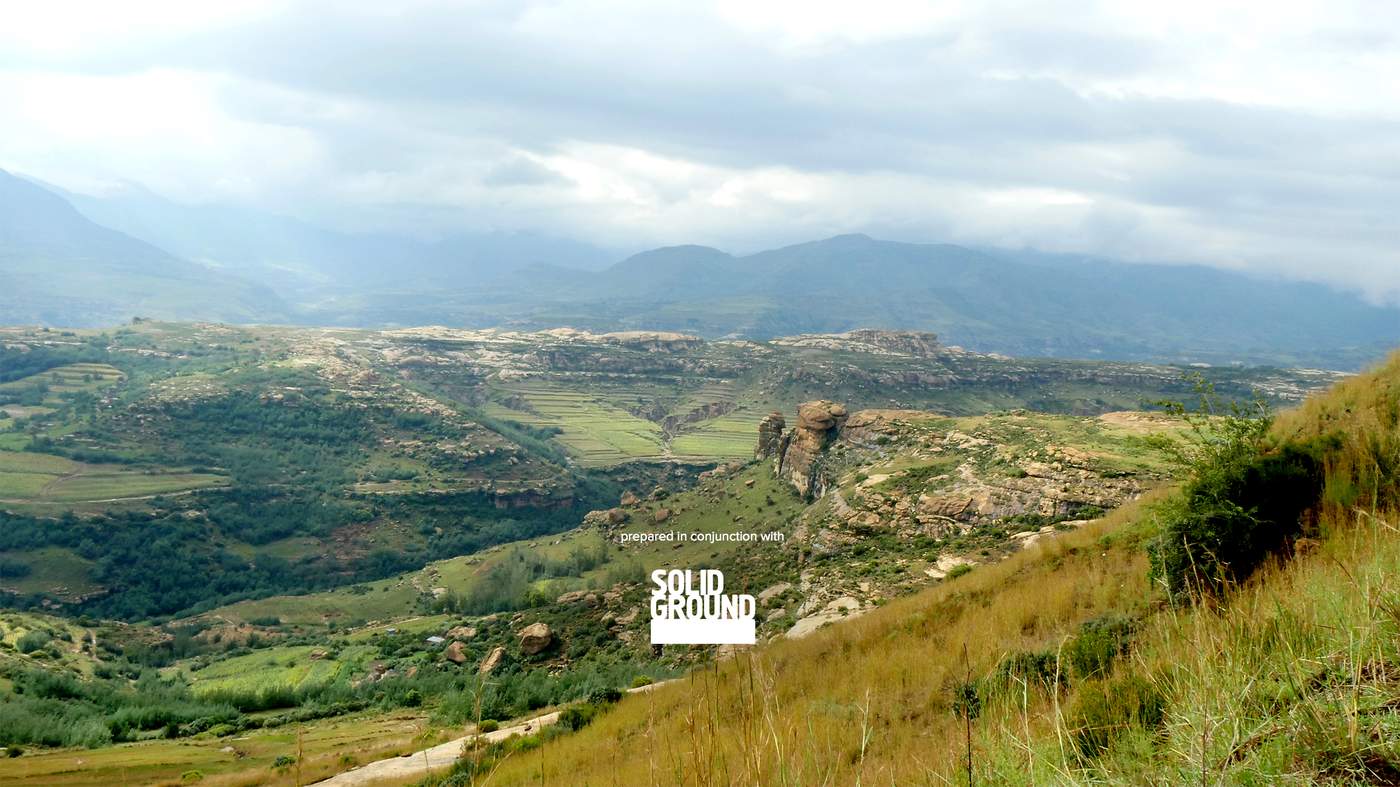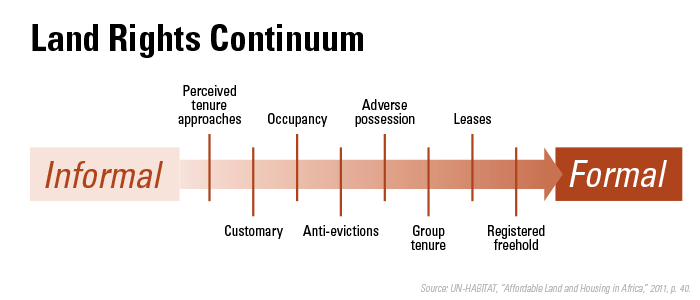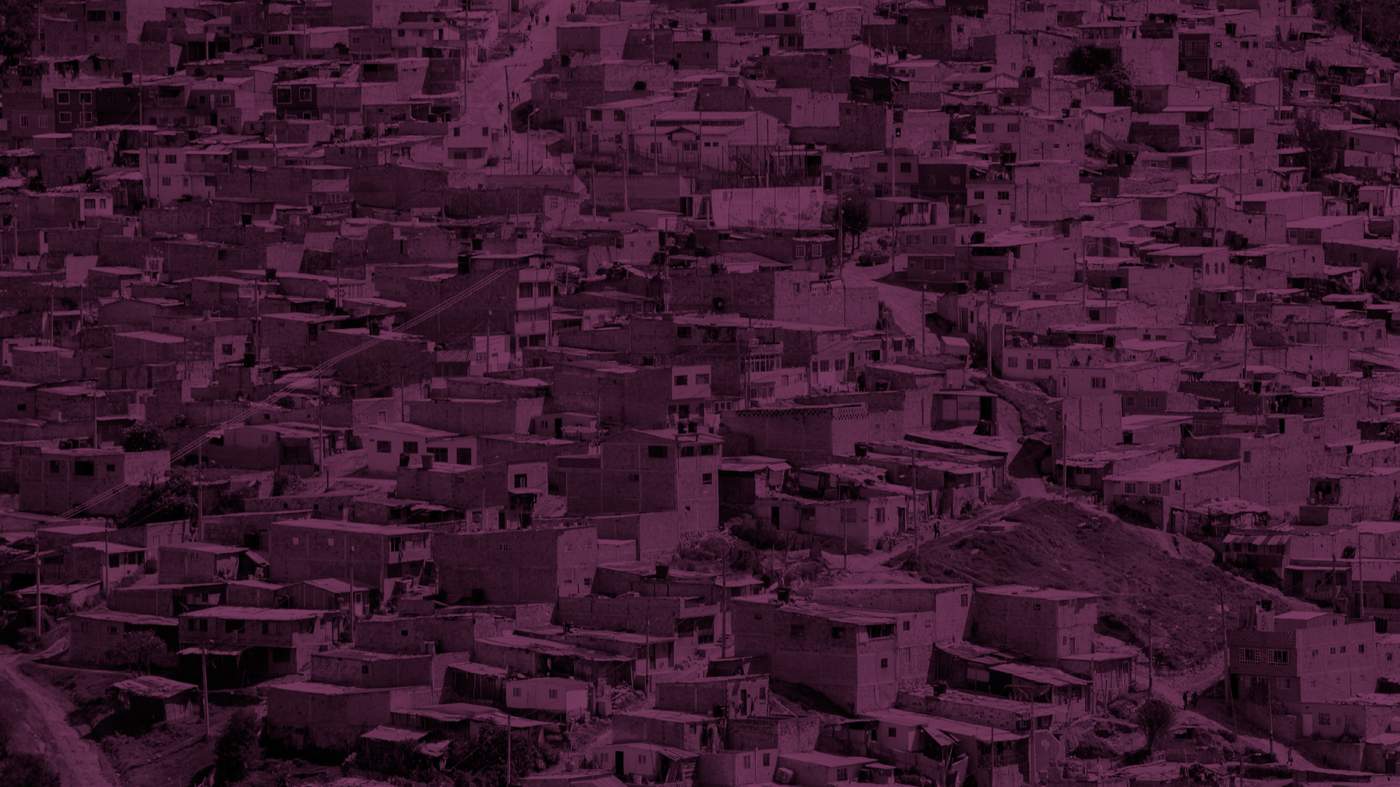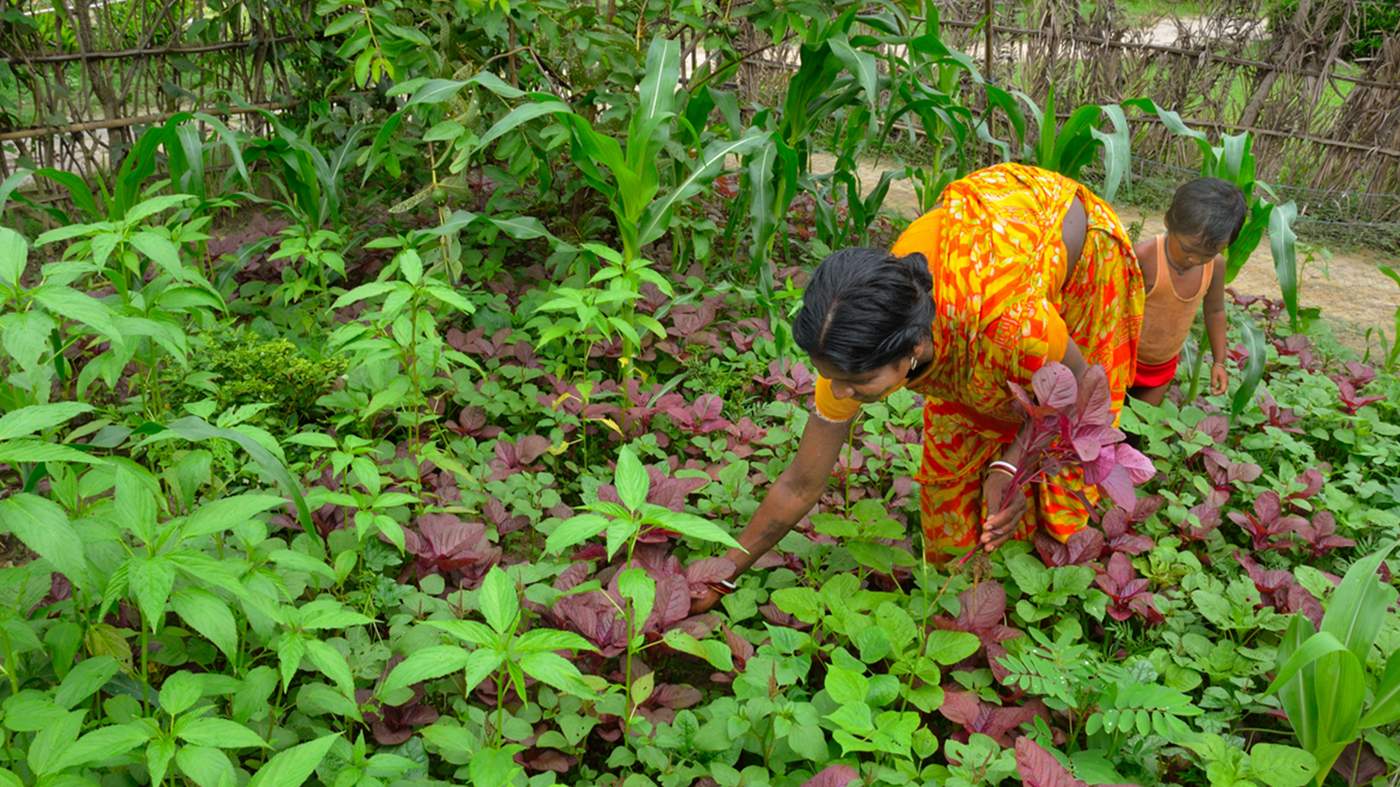Land tenure is one of the great challenges Habitat for Humanity faces in helping families access decent housing. Countless families around the world lack rights to the land on which they live. Just imagine the stress of knowing that any day you might be forced to move because someone else claims ownership of the place you call home.
For instance, Mamolelekeng Nkoebele, an 82-year-old woman in Lesotho, was single-handedly raising five orphaned great-grandchildren when the land they had occupied for years transferred ownership. With a new owner and no legal claim to the land, Nkoebele and her family lived in constant fear of eviction.
Recognizing that lack of secure property rights acts as a major barrier to decent housing, Habitat Lesotho worked alongside community leaders to allocate land and grant tenure rights to families like Nkoebele and her great-grandchildren. Once Nkoebele had the legal right to occupy the land on which she lived, she was able to embark on the pathway to decent housing, eventually becoming the proud owner of a new home.
The security of property rights is a crosscutting issue that impacts all areas of Habitat’s work. Whether addressing the needs of displaced people as a result of disaster or conflict, providing water and sanitation, working in informal settlements, or facilitating access to microfinance for incremental housing, Habitat’s work to provide decent shelter and create sustainable, stable, resilient communities can occur only if community residents have legal control of the land on which they live.
For that reason, Habitat cares deeply about ensuring access to secure property rights for everyone, especially women, who are disproportionately affected by lack of secure tenure. We have seen how impactful women are on the lives of their children and communities, and we have witnessed firsthand how ensuring secure property rights for women reverberates through communities to provide far reaching benefits.
Habitat is working side by side with women to increase their property rights in a number of ways, including offering microloans and education on land and inheritance rights. Advocacy concerning land tenure is a huge focus in our work around the world. From community decision-making bodies to national governments and international organizations, Habitat is working at all levels to change policies and systems. In early 2016, we will launch Solid Ground, a global advocacy campaign to increase access to land for shelter. A key component of the campaign includes secure property rights for women.
In our 2016 Shelter Report, we examine how secure tenure impacts women, specifically in reference to housing. We identify solutions and best practices and provide recommendations for advocates and policymakers alike.
Increasing property rights for women is a crucial first step toward ending poverty housing. I hope you will join me in advocating for more secure tenure on behalf of all women around the world in need of decent shelter.
In partnership,
Jonathan T.M. Reckford
CEO, Habitat for Humanity International
Mamolelekeng Nkoebele is a remarkable woman. What makes her different? She’s 82, and she’s single-handedly raising five orphaned great-grandchildren.
Nkoebele lives in Teyateyaneng — commonly called TY — about 25 miles from Lesotho’s capital, Maseru. Like most of Lesotho’s population, she lives in a household defined as “poor,” meaning that Nkoebele cannot feed, clothe and educate her family.
Poverty runs deep in Lesotho, with about 40 percent of the 2 million inhabitants living below the international poverty line. Being orphaned and poor is even worse. Orphans and vulnerable children often live in unhealthy conditions, are exposed to abuse, and struggle to access education and basic services. That’s why Nkoebele took her great-grandchildren in when their parents died.
Initially, Nkoebele got by. A generous landowner allowed them to live in a shack for free. “It was open to both the elements and intruders,” she said. “It was our home. Still, someone had to be home at all times to guard our possessions.” But even that limited level of security changed when their landlord decided to sell the land. The new owner wanted to evict them.
“With the impending change in ownership, we felt constantly threatened.”
Since 2007, Habitat Lesotho and community leaders have worked together to change this reality. They have identified orphaned and vulnerable children and their families who desperately need help.
If, like the Nkoebeles, a family does not have their own land, the community allocates land and gives the family tenure rights. After this, Habitat Lesotho procures material and engages a builder to build a simple yet durable two-roomed house.
The remarkable Mamolelekeng Nkoebele is happier now, with a new house, a cleaner and safer environment, and better opportunities for her great-grandchildren, who will have a secure place to live after she’s gone.
How secure land rights impacts women
When women have secure land rights, they have greater opportunities to get and keep jobs, start or grow businesses, and invest or save money, while also having a greater say in how household income is spent. When women are invested in a community, they increase their social participation and enjoy a greater influence over community decisions. Land rights also help women access identification cards and other documentation that can allow them to exercise their full citizenship rights.
When women have secure land rights, their ability to invest in their own health and that of their children increases. Women also are able to improve their safety and reduce their risk of domestic and gender-based violence. The positive impact that secure land rights have on women also affects their children’s well-being.

Women with strong property and inheritance rights earn up to 3.8 times more income. [1]
Where women’s property and inheritance rights are stronger, women’s individual savings are up to 35 percent greater.[2]

Families where women own more land devote more of their budget to education.[3]

Women who own land are up to 8 times less likely to experience domestic violence.[4]

Children whose mothers own land are up to 33 percent less likely to be severely underweight.[5]
Children in households where women own land are up to 10 percent less likely to be sick.[6]
Falicia Yavira's story
Falicia Yavira is a mother in Bolivia. She and her five children live in Cochabamba, a city known as “City of Eternal Spring” for its year-round mild temperatures. Bolivia is one of the poorest countries in South America; more than half of the national population lives below the poverty line. Yavira’s small house has one bedroom, one storage room and an outdoor kitchen. When Yavira’s husband passed away, she and her five children were at risk of losing their home simply because Yavira’s name was not listed on the property title. Without her name listed, she had no legal claim to the land.
Unfortunately, Yavira’s case is not unique. In Bolivia, 20 percent of families are headed by women, [7] yet until recently, Bolivian law treated men and women differently, requiring only the man’s name to be listed on the property title. If a man died or left his wife or partner, she could find herself with no home and no recourse. This discriminatory policy left thousands of women headed Bolivian families without the legal right to their land and living in fear of eviction.
Fortunately for her children, Yavira was not afraid to use her voice to call for change. She joined the Women’s Network for Secure Land Tenure, an advocacy group in Cochabamba that was formed with the support of Habitat Bolivia and other organizations. In 2012, Yavira and other women in the network traveled to the capital of Bolivia to meet with government officials and advocate for fairer laws.
As a result of their work, several changes were made to Bolivian property law, including a provision that now states that property must be registered in the names of both spouses. This seemingly minor change in the law had monumental results; it was the first step to securing equitable land rights for every woman in Bolivia, including Yavira and her fellow advocates.
Securing land rights in Cambodia
Ngin Savun, an army retiree and mother of three, lives in Makara Village in Battambang, Cambodia. In 2006, Savun bought a small corner plot of land and built a small brick and wood home for her family. The house did not have access to the municipal water or sanitation system and was not well-constructed. During the rainy season, the house would flood, with water often rising above Savun’s knees. Like many others in the area, Savun did not have a secure title to the property and was always fearful that the land might be taken away from her.
In 2008, Savun heard about the Social Land Concession Project, a collaboration between Habitat Cambodia and the Battambang government, and began to attend all of the project’s community meetings. That same year, with Habitat Cambodia’s help, Savun began the application process to obtain a proper certificate for her land.
“Before Habitat came, I was hopeless about the land,” Savun said. “When they came with the [Social Land Concession] Project, I could not believe that I would have the chance to keep my land secure.”
In 2012, Savun received the certificate for her land and used her savings to begin construction on a new home. Having the land certificate also meant that she could obtain a loan from Habitat Cambodia’s microfinance institution partner to complete the construction.
“I am no longer afraid,” she said. “It is such a warm feeling to live in a secure home. My new house is always secure, and there is no flooding.”
Savun started a noodle shop in front of her new home, and now serves a steady stream of customers each morning with the help of her older sister. Savun uses the income from her noodle shop and her army retirement income to pay off the loan.
Now living with a steady economic income and without fear of eviction, Savun looks to a positive future for her children and encourages them to pursue their profession of choice. Her 13-year-old daughter aspires to become a Khmer language teacher at a nearby children’s school.
Reflecting with pride on how far she has come since living in her old house, Savun said, “Looking back now, I never thought I would get this land and be secure here. I have been able to improve our lives so much with help from Habitat Cambodia because of this project, starting my business and by getting the loan to build the house.”
Recommendations
1. Formal legal and policy reform is foundational.
In Bolivia, Habitat helped establish the Women’s Leadership Network, a school that educates women about the technical and legal aspects of land rights. In 2012, this school developed a policy reform proposal which was adopted into law. This law, which changed property deed forms to require that men and women both be listed, has allowed nearly 2 million women in Bolivia to now have the right to have their names listed on property deeds.
2. Awareness of rights and how to access them is key.
In Kenya, land has become a major issue because of population increases and land expropriation. As land becomes scarcer, women in particular are more vulnerable to landlessness and associated hardships. In 2009, a new policy strengthened land rights for women by eliminating gender discrimination in the law. Since many of the land disputes are settled in local courts, many of those courts were unaware of the new policy. Organizations worked together to increase awareness of women’s rights and as a result of the program, women’s access to land and awareness of their rights had both increased.
3. Implementation and enforcement of laws and policies are essential.
The Brazilian government issued an ordinance to better align the national housing resettlement regulations with international standards. Brazil’s constitution recognizes housing as a human right, but the law recognizes rights that go beyond replacement of the physical home during resettlement to include social and livelihood conditions of affected families. Building on this change, Habitat worked in coalition with other groups to advocate for a related resettlement policy in the state of Pernambuco. The policy proposed by the civil society coalition was approved in April 2014, potentially benefiting up to 4 million people.
4. Gender representation in land governance institutions is crucial.
A new project in Ethiopia has demonstrated how women can participate in the institutions that influence and lead to land tenure governance, land administration, land use and infrastructure planning. The project ensured that women were included as both beneficiaries and as members of project teams. By including both men and women in Ethiopia’s land use planning, they were able to fully understand who controlled resources and how women participated in public and family decision-making. [10]
5. Convenient and affordable access to the legal system is critical.
In India, a 100-year-old law inherited during British rule was replaced with a new law that has dramatically improved the efficiency of the land processes, increased transparency and reduced the need for lengthy bureaucratic procedures, through the use of online of land records. These changes made the process more efficient and affordable to all. Local computer kiosks have been installed and operated in remote areas, increasing access to land registry services for low-income populations in Karnataka who would normally be excluded. [11]
6. A holistic approach is best.
Several organizations have worked together to develop training curricula on gender and property rights and provide field tools for grassroots paralegals, community-based volunteers who provide legal education and aid, can play an important role in ensuring that women have the ability to exercise their right to property and assets. These partnerships have focused on sensitizing communities about women’s property rights by implementing a paralegal program like the one in Uganda’s Luwero District. Each paralegal was trained to use a range of community education and engagement techniques and to work with influential people within the community. This project increased the community’s knowledge and understanding of the law regarding women’s property rights.
Solid Ground is Habitat’s global advocacy campaign to increase access to land for shelter.
Women are disproportionately affected by land rights issues, and entire communities reap the benefits of advanced land rights for women. Solid Ground will mobilize existing and new allies to motivate policymakers to enact and implement policies that will advance access to land for shelter.
Conclusion
Land is foundational to building a decent home. Millions of women around the world still live without secure land rights and with a fear of eviction that affects their housing, safety, health, social status and other areas of their lives. Habitat continues to advocate for secure land rights by working toward effecting change in laws and policies regarding land tenure as well as increasing awareness, access to information and implementation of existing rights.
Get involved:
Download and read the full 2016 Shelter Report (PDF, 1.8mb).
Learn about Habitat III, the UN Conference on Housing and Sustainable Urban Development, and what you can do to take action.
Learn more about Habitat's advocacy efforts.
Citations
- A. Peterman, "Women's Property Rights and Gendered Policies: Implications for Women's Long-term Welfare in Rural Tanzania." Journal of Development Studies 47(1), 1-30. 2011.
- Ibid.
- C. Doss, “The Effects of Intrahousehold Property Ownership on Expenditure Patterns in Ghana”, J. AFR. ECON 15(1): 149-180, at 171. 2006.
- B. Agarwal and P. Panda, “Toward freedom from domestic violence: the neglected obvious.” Journal of Human Development 8(3): 359-388. 2007.
- K. Allendorf, “Do Women’s Land Rights Promote Empowerment and Child Health in Nepal?” World Development, 2007.
- N. Menon, Y. van der Meulen Rogers, and H. Nguyen, "Women's Land Rights and Children's Human Capital in Vietnam," World Development 54, 18-31. 2014.
- unstats.un.org/unsd/demographic/products/dyb/dybHousehold/2.pdf (PDF), p. 52.
- International Land Coalition, “Complementing the state: the contribution of the watchdog groups in protecting women s land rights in Gatundu District”
- International Center for Research on Women, “Community-Based Legal Volunteers in Action” (PDF)
- Land Use Planning: Concepts, Tools and Applications (PDF), p. 181.
- Bhoomi Land Records on Web




